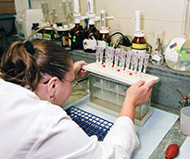2/8/2018
Tennessee Court Strikes Down Paying Lab For DUI ConvictionsAppellate court in Tennessee declares unconstitutional a law that pays state lab for each DUI conviction it generates.

Labs testing blood or breath results for motorists cannot be trusted if they have a financial incentive to produce a conviction. That was the finding Tuesday of the Tennessee Court of Criminal Appeals, which overturned Rosemary L. Decosimo's conviction for driving under the influence of alcohol (DUI) because the state lab collects a $250 fee if the report results in a conviction.
The $250 blood alcohol or drug concentration test (BADT) fee that convicted motorists pay to the Tennessee Bureau of Investigation (TBI) generates $3 million in annual revenue. The agency recently cited money problems as the reason it raised the fee for its lab testing. Under state law, any result from the TBI lab is automatically acceptable for use as evidence in court.
A group of twenty accused drivers joined together to challenge as unconstitutional the law creating a financial interest in finding motorists guilty. TBI Special Agent Kyle Bayer was fired in 2013 after he botched lab results, falsely accusing a motorist with a legal .01 blood alcohol level of being three times over the limit.
"Unfortunately, we had one incident in the Chattanooga area where a young forensic scientist made a mistake," TBI Director Mark Gwyn testified in 2014. "He paid for that mistake. He was dismissed. We've outsourced all of the cases that [Kyle Bayer] had worked. We have 2,000 of them back, and there's been no other mistakes."
Prosecutors insisted that the $250 test fee was no different from any other court-imposed fee. They also insisted that the ability to independently test DUI evidence prevents the state lab from cheating. Tuesday's ruling cited the testimony of a DUI attorney who explained that, while it is possible to independently test the state's DUI test results for just $250, the expert witness needed to introduce such findings at trial can cost between $15,000 and $40,000.
"Indigent defendants charged with DUI are particularly affected by this reality because they cannot afford to independently test their blood or breath sample, much less hire an expensive expert to challenge the BAC result at trial, and are unlikely to be given state funds to cover these expenses in a misdemeanor prosecution," Judge Camille R. McMullen wrote.
The three-judge appellate panel held that the fees violated the due process rights of the accused because they created an incentive for bias in the lab technicians who would lose their jobs if they exonerated too many motorists.
"There is no question that the TBI, an agency of the state, has a direct pecuniary interest in securing convictions," Judge McMullen wrote. "The TBI forensic scientists also have a financial interest in securing convictions because the collection of the BADT fees affects their continued employment and salary, which gives them an incentive to find that defendants' blood alcohol content is 0.08 percent or higher."
A copy of the ruling is available in a 250k PDF file at the source link below.


